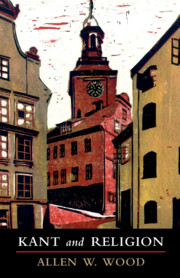Book contents
- Kant and Religion
- Cambridge Studies in Religion, Philosophy, and Society
- Kant and Religion
- Copyright page
- Dedication
- Contents
- Citations
- Preface
- Cover Image
- 1 Religion and Reason
- 2 Moral Faith in God
- 3 The Radical Evil in Human Nature
- 4 The Change of Heart
- 5 The Son of God
- 6 Grace and Salvation
- 7 The Ethical Community and the Church
- 8 Freedom of Conscience
- Concluding Remarks
- Bibliography
- Index
7 - The Ethical Community and the Church
Published online by Cambridge University Press: 08 May 2020
- Kant and Religion
- Cambridge Studies in Religion, Philosophy, and Society
- Kant and Religion
- Copyright page
- Dedication
- Contents
- Citations
- Preface
- Cover Image
- 1 Religion and Reason
- 2 Moral Faith in God
- 3 The Radical Evil in Human Nature
- 4 The Change of Heart
- 5 The Son of God
- 6 Grace and Salvation
- 7 The Ethical Community and the Church
- 8 Freedom of Conscience
- Concluding Remarks
- Bibliography
- Index
Summary
Kant holds that the origin of our propensity to evil arises in connection with our unsociable sociability. The effective response to it, therefore, must also be social. We must leave the ethical state of nature and join with others in voluntary ethical community, where our shared ends, conceived as the highest good, under the legislation of a divine lawgiver will promote moral progress among human beings. The existing communities of this kind are churches and ecclesiastical faiths, which fall short of their religious vocation but can and should be reformed so as to live up to it. The relation of rational religion to revealed religion is therefore intended by Kant to be dynamic, with the interpretation of revealed religion enriching rational religion and the reform of revealed religion bringing rational and revealed religion into closer harmony, leading gradually toward the founding of the Kingdom of God on earth.
Keywords
- Type
- Chapter
- Information
- Kant and Religion , pp. 164 - 184Publisher: Cambridge University PressPrint publication year: 2020



